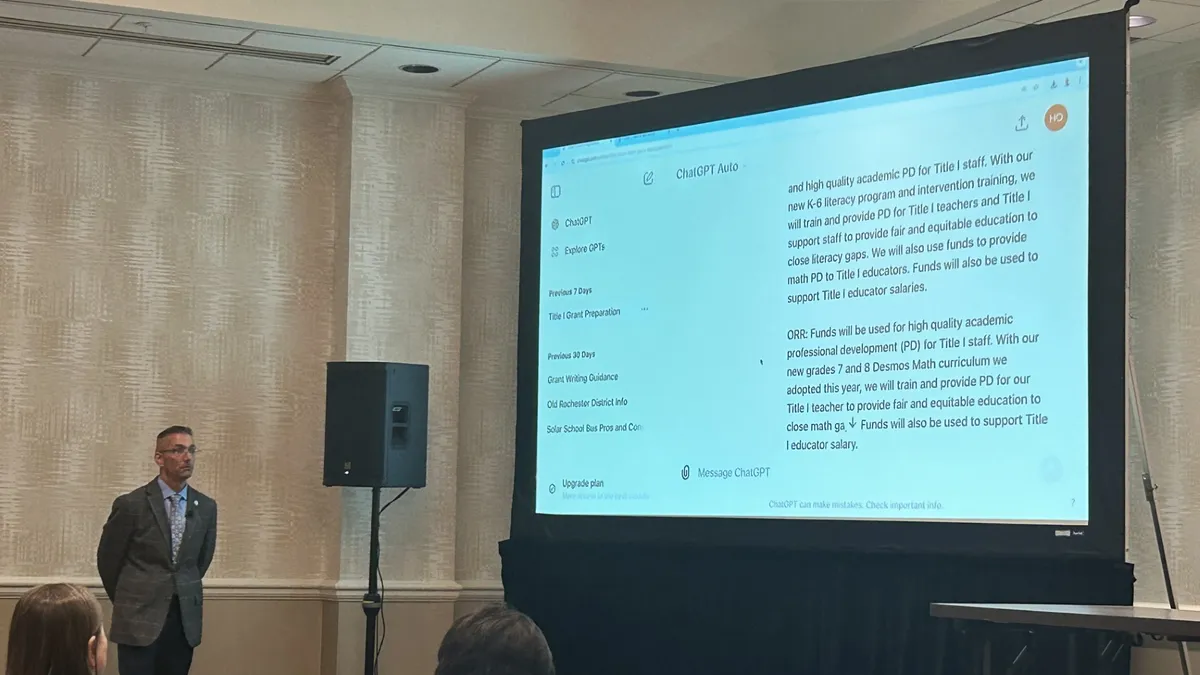NASHVILLE — While the public focus on artificial intelligence in K-12 education is often on teacher and student use, school district finance officials are beginning to find their own ways to benefit from generative AI tools.
Throughout the Association of School Business Officials International’s annual conference, several sessions held between Sept. 18-20 explored how administrators are already tapping into the technology for their roles — including grant writing assistance and drafting budget narratives.
For school administrators looking to use AI, it’s important to ensure the tools are accessed through an enterprise service, which the district must pay for to guarantee strict security requirements and data privacy measures are in place, said Bill Sutter, chief financial officer for Boulder Valley School District in Colorado, during a Sept. 18 session. That is not the case for free and publicly available AI tools, like ChatGPT, which often flag data privacy concerns.
If administrators still want to try out free generative AI tools, Sutter recommends they do not use names or disclose any personal identifying information. “What would otherwise be very secure data” would then be accessible to the public sphere, because the free tools tap into users’ information to train their systems.
Grant writing
Still, administrators are finding ways to use AI tools while approaching them with caution.
During a Thursday session, Howard Barber, assistant superintendent of finance and operations for the Old Rochester Regional School District and Massachusetts School Superintendency Union #55 in Mattapoisett, Massachusetts, shared how useful AI can be when applying for school grants and determining eligibility.
When filling out competitive grants, Barber said, administrators should try to make their writing stand out. AI can help with that by brainstorming creative ways to craft answers in applications, he said. Once an administrator completes their research for an application, they can share their findings with AI to help shape their responses.
School leaders can also use these tools to strategize programs that comply with a grant, he said.
Conference speakers also discussed the qualities of a good generative AI prompt, which include being specific, adding context, stating the purpose of a prompt, prioritizing clarity, requesting specific results, limiting multiple questions, checking for assumptions, and asking for examples.
One tip Barber suggests that users keep in mind when working with AI is that these tools can remember information from previous questions in the same chat. If you want AI to carry information from other conversations, it’s also recommended to ask AI for a summary of the conversation. From there, users should save that summary in a separate document and then share it with AI again when starting a new conversation.
Conference speakers also warned that AI can have hallucinations — or generate false information — which is why Barber said it’s important to closely read over and fact check anything AI generates before putting it in a grant application.
“Please don’t just copy and paste,” Barber said, adding that if an administrator submits a mistake made by AI into their grant application, it could potentially hinder future opportunities.
Drafting budget narratives
AI can also be helpful for school finance officials when they have to communicate their district budgets, for example, in public school board meetings, said Mary Ellen Normen, administrator for business and finance at Lincoln Public Schools in Massachusetts, during a Friday session.
That being said, administrators need to consider the professional ethics of using AI in their work, particularly when it involves whether they disclose that they used the tool, she added.
“Be mindful that as you’re using AI, there is another coauthor with you, and so be mindful about what that is and also be mindful around false interpretations” by AI, Normen said. It’s especially important that an administrator’s voice is present in their work when tapping into AI tools.
If an administrator is using AI, they should have someone else proofread their budget memo before distributing it to the public, Normen said.
AI can also prepare administrators to answer questions that may be asked by school community members about the budget once it’s presented, she said. One example of using AI as a self-reflective tool could be uploading a budget memo and asking AI if there is any missing information.
“That’s one of the other pieces of AI that is helpful,” Normen said. “It can give you that critical feedback that you know you’re going to get from citizens and residents ahead of time, so that you can be prepared to answer those right off the bat.”















